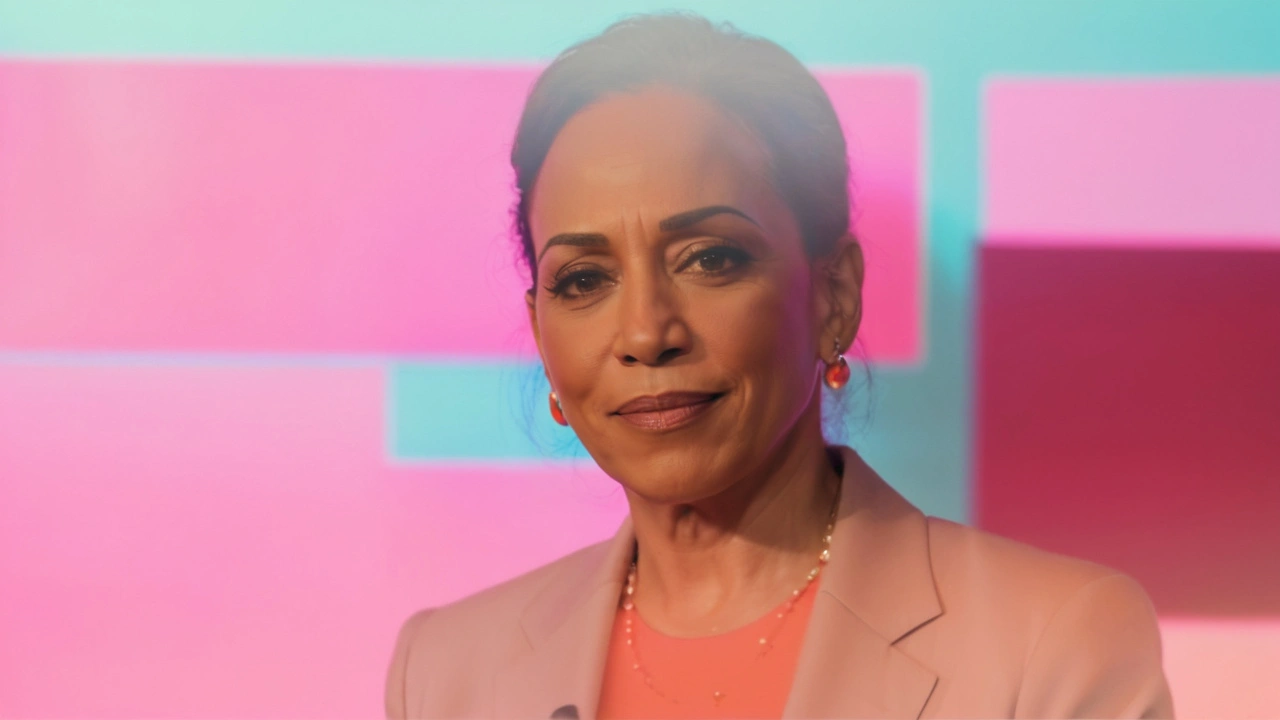Kamala Harris Secures Democratic Nomination for Presidential Election

Vice-President Kamala Harris has achieved a significant milestone in her political career by securing enough support from delegates to clinch the Democratic Nomination for the upcoming presidential election. This development comes as a major win for Harris, who has been tirelessly campaigning on various critical issues to garner the backing of her party.
With the convention set for August, Harris’s nomination is poised to be formalized, marking a defining moment in her journey toward potentially becoming the nation's next president. As she prepares for this pivotal event, it is essential to look at the path that has led her to this point, and the key issues her campaign has highlighted along the way.
Path to Nomination
Gaining the majority support from delegates has not been an easy feat. Harris has had to navigate a complex landscape, engaging with various factions within the Democratic Party to unite them under her vision. This process involved numerous town hall meetings, debates, and relentless grassroots campaigning.
Her ability to resonate with both progressive and moderate wings of the party speaks volumes about her political acumen. This unification is critical as the Democratic Party prepares for a fiercely competitive electoral battle. Harris’s nomination indicates a broad coalition of support that could prove advantageous in the general election.
Key Campaign Issues
One of the major focuses of Harris’s campaign has been on healthcare reform. She advocates for a more inclusive healthcare system that ensures coverage for all Americans. This stance is seen as a continuation and expansion of the Affordable Care Act, addressing gaps that still leave many vulnerable.
Another cornerstone of her campaign is climate change. Harris has consistently emphasized the urgent need for policies that address environmental challenges. Her campaign promises include substantial investments in green energy and infrastructure, aiming to reduce the nation’s carbon footprint significantly.
Further, Harris has highlighted the importance of social justice and police reform. Building on movements for racial equality, her proposals include initiatives that aim to bridge the disparities in the justice system. Investment in education and community programs feature prominently as part of her broader plan to create equitable opportunities.
A Historic Milestone
Harris’s nomination is not just a personal achievement; it symbolizes a historic moment for the Democratic Party and American politics at large. Should she win the presidential election, Harris would make history as the first female president of the United States, also representing significant progress for women of color in leadership roles.
The August convention will formalize her candidacy, setting the stage for the next phase of her campaign. This event is expected to draw significant attention and could serve as a powerful platform to rally the Democratic base as they head towards the general election.
Future Challenges
Despite this triumph, Harris faces numerous challenges ahead. The general election promises to be contentious, with the opposition ready to scrutinize her record and policies closely. It will be crucial for Harris to maintain the momentum and continue appealing to a broad spectrum of voters.
Moreover, the political climate remains highly polarized, requiring a delicate balance in addressing the diverse concerns of the electorate. Navigating this environment will demand significant strategic planning and effective communication from Harris and her campaign team.
As the nation watches closely, Kamala Harris’s journey to the Democratic Nomination sets the stage for a potentially transformative election. Her ability to harness this support and translate it into a win in November could shape the future of American politics profoundly.






Gift OLUWASANMI
July 29, 2024 AT 20:55Alright, let’s cut through the smog-Harris’ “historic” moment is just another chapter in the endless circus of political theater, where grandiose narratives mask the same old policy vacuity. She’s pandering to every faction, stitching a quilt of compromise that will inevitably tear when real governance begins. The delegate count feels less like a victory and more like a cleverly orchestrated applause for a rehearsal.
Keith Craft
August 1, 2024 AT 23:45My heart practically vaulted off the page upon learning that Vice‑President Harris has finally seized the Democratic torch; it is as if the very heavens have aligned to herald a new epoch of hope. Yet beneath this operatic proclamation lies a labyrinth of ambition that only the most diligent of us can navigate without succumbing to melodrama. Let us therefore proceed with measured reverence, lest we drown in the tide of our own exhilaration.
Kara Withers
August 5, 2024 AT 02:34For those tracking the policy specifics, Harris’ platform expands the Affordable Care Act by introducing a public option that could lower premiums for middle‑income families while preserving private plans. Her climate agenda earmarks $300 billion for renewable infrastructure, aiming to hit 50 % clean energy by 2035. These concrete proposals suggest she’s moving beyond rhetoric toward actionable legislation.
boy george
August 8, 2024 AT 05:23Harris’ ability to stitch together the party’s warring wings is impressive.
Cheryl Dixon
August 11, 2024 AT 08:13While many celebrate the nomination as a watershed moment, it’s worth remembering that history is rarely a straight line; a single win does not guarantee transformative governance. The real test will be whether her campaign’s lofty ideals survive the brutal pragmatism of a divided electorate.
Ramesh Modi
August 14, 2024 AT 11:02Oh, the grandeur of a nomination!-the glittering ceremony of delegates, the thunderous applause, the tear‑filled speeches!-yet beneath this spectacle lies a deeper moral crucible, a test of consciousness that our nation cannot afford to ignore!; Harris must confront the systemic inequities that have persisted for generations, and she must do so with unwavering resolve!; The healthcare pledge, the climate crusade, the justice reforms-each is a banner of hope, yet each demands painstaking implementation!; Let us not be seduced by the pageantry, but rather demand concrete action, lest our aspirations dissolve into vapor!; In this arena, sincerity outshines spectacle, and only through relentless dedication can she transform rhetoric into reality!; Remember, the road ahead is littered with compromise, but compromise does not have to mean surrender!
Ghanshyam Shinde
August 17, 2024 AT 13:52Sure, a delegate count is the ultimate measure of competence-just ask any reality TV show.
Charlotte Louise Brazier
August 20, 2024 AT 16:41We need to rally behind Harris not just because she’s a milestone, but because her policies could finally address the systemic gaps that have left too many communities behind. Climate action, affordable healthcare, and criminal‑justice reform aren’t optional-they’re essential for an equitable future. Let’s channel our collective energy into demanding that those promises translate into real change.
SAI JENA
August 23, 2024 AT 19:30Congratulations to Vice‑President Harris on securing the nomination; this achievement reflects both strategic acumen and steadfast dedication. As the campaign progresses, it is imperative that we maintain a disciplined focus on policy implementation and voter outreach. I encourage all supporters to engage constructively, amplify the platform’s key messages, and ensure a robust presence across all battleground states.
Donny Evason
August 26, 2024 AT 22:20Gift, your cynicism is noted, but dismissing the delegate coalition as mere theater ignores the genuine grassroots energy that propelled Harris forward. The party’s base is demanding substantive change, and that momentum can’t be brushed aside as “vacuity.”
Hariom Kumar
August 30, 2024 AT 01:09Charlotte, you nailed it-let’s turn that optimism into action 😃. Every community deserves the climate and healthcare promises you highlighted.
Phillip Cullinane
September 2, 2024 AT 03:59From a strategic communications standpoint, Harris’ acquisition of the requisite delegate count serves as a salient signal to intra‑party stakeholders, effectively consolidating her position as the presumptive standard-bearer for the Democratic caucus; this signal amplification is further reinforced by the robust integration of data‑driven outreach methodologies that have undergirded her campaign’s micro‑targeting efficiencies. Moreover, the policy architecture delineated in her platform exhibits a multidimensional alignment with contemporary public‑health imperatives, particularly the proposed augmentation of the Affordable Care Act through a tiered public‑option framework designed to mitigate adverse selection while preserving market competition. In the environmental arena, the earmarked $300 billion investment capitalizes on emerging renewable technologies, fostering a decarbonization trajectory that adheres to the Paris Agreement benchmarks, thereby engendering both domestic resilience and international diplomatic capital. The justice reform propositions incorporate a bifurcated approach: procedural safeguards to curtail excessive law‑enforcement discretion coupled with substantive investments in community‑based restorative programs, which collectively aspire to attenuate recidivism rates. Institutional capacity building is also a cornerstone; the campaign’s emphasis on expanding federal grant pipelines to under‑served jurisdictions is poised to catalyze socioeconomic uplift. From an electoral calculus perspective, these policy vectors are calibrated to broaden the candidate’s appeal across the median voter spectrum, thereby enhancing coalition durability in swing districts. The operational tempo of the campaign, characterized by a relentless cadence of town‑hall engagements, augments candidate visibility and fortifies relational trust among heterogeneous voter blocs. Additionally, the strategic deployment of narrative framing-emphasizing “hope” and “unity”-operates as a cognitive heuristic that simplifies complex policy constructs into digestible stakeholder messages. Nonetheless, the exigencies of political polarization necessitate a calibrated risk management protocol to preempt potential backlash from entrenched interest groups opposed to progressive fiscal reallocations. In this vein, the campaign’s macro‑budgetary projections embed contingency reserves to insulate against fiscal volatility. The confluence of these strategic elements coalesces into a comprehensive governance blueprint that, if executed with fidelity, could substantively reshape the national policy landscape. Ultimately, the durability of Harris’ political ascendancy will be contingent upon her capacity to translate these schematics into legislative enactments, thereby converting aspirational rhetoric into operational reality.
Janie Siernos
September 5, 2024 AT 06:48It’s encouraging to see a focus on equity, though true progress will require unwavering commitment beyond campaign promises.
joy mukherjee
September 8, 2024 AT 09:38I appreciate the emphasis on inclusive policies-healthcare, climate, and justice-all essential pillars for a fair society 😊. Let’s keep the conversation constructive and push for concrete steps.
Rob Chapman
September 11, 2024 AT 12:27Phillip, your deep dive underscores how policy, narrative, and operational rigor intertwine; it’s a reminder that grand visions need grounded execution.
Delaney Lynch
September 14, 2024 AT 15:16Indeed, the comprehensive approach you outlined is impressive!!! However, let’s remember that voter engagement at the grassroots level is the ultimate litmus test!!!
Nicholas Mangraviti
September 17, 2024 AT 18:06History won’t rewrite itself without action.
Jared Greenwood
September 20, 2024 AT 20:55While the nomination marks a symbolic victory, the real battle lies in defending national sovereignty against globalist overreach embedded in progressive climate mandates.